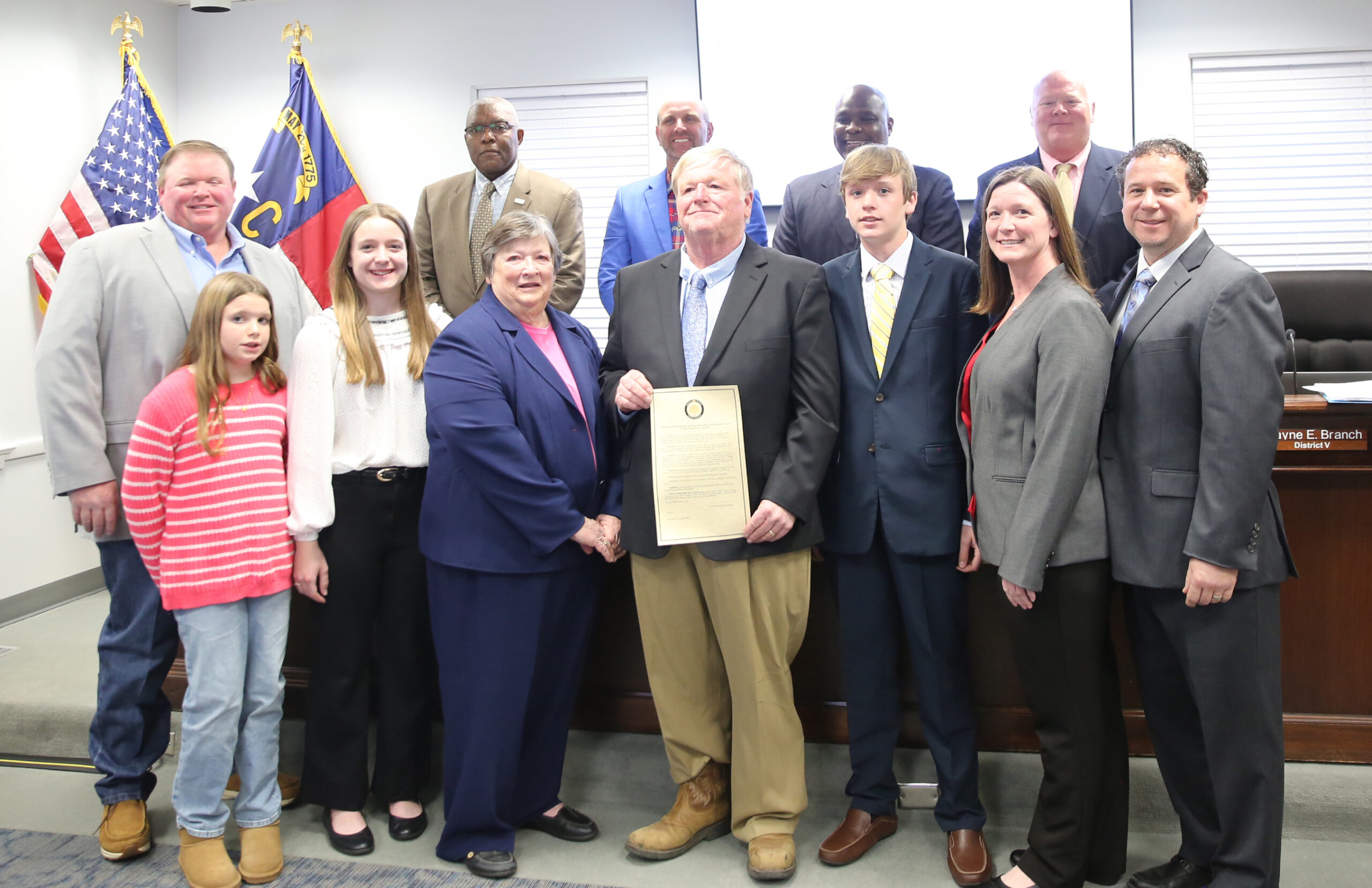KENANSVILLE — A tearful Dexter Edwards smiled broadly as he was surprised by family and colleagues with a special recognition at the County Commissioners meeting on March 3. The longtime county commissioner and chairman was honored for his recent induction into the North Carolina Pork Hall of Fame.
During the meeting, Vice-chair Elwood Garner welcomed the Edwards family to share in the recognition. After a brief motion to approve the resolution, the commissioners officially presented the honor to Edwards, and Garner read the resolution acknowledging his long-standing contributions to the pork industry.

“The North Carolina Pork Council Hall of Fame is the highest honor bestowed by the organization. It recognizes individuals with long and outstanding service to the North Carolina Pork Industry and to the North Carolina Pork Council,” said Garner as he read the document.
The resolution emphasized the North Carolina Pork Council’s significance as the oldest state pork producer organization in the nation. It also outlined the criteria for induction into the North Carolina Pork Hall of Fame, which includes lasting contributions to the pork industry, community involvement, recognitions, certification in industry standards, and a record of environmental compliance.
Edwards’ journey into the industry began on Feb. 23, 1962, on his sixth birthday, when he received his first hog as a birthday present from his dad.
In an interview with Duplin Journal, Edwards fondly recalled that memorable morning when his dad took him to help feed the pigs before school. As they approached the pen, his dad told him to look inside for his birthday present.

“He said, ‘your birthday present is in that pen right there,’” Edwards reminisced.”Being just six years old, I’m looking in the pen to see what in the world I got for my birthday and I said, I don’t see anything.” He recalled his dad encouraging him to ”open his eyes,” and that’s when he noticed four or five gilts in the pen. His dad told him to pick one, and that would be his gift. Edwards chose the gilt, and when he returned home from school, she had eight little piglets.
“I went from a one-hog man to a nine-hog man in one day. When those pigs were big enough to wean away from mama, I traded those pigs to daddy for calf cows,” said Edwards, adding that from that point on, he has been involved in both the hog and cattle businesses.
“Daddy always had hogs and I ran some hogs with him,” he said, explaining that he worked alongside his dad, but he kept his involvement to a minimum until he turned 16.
Once he reached that age, his dad allowed him to buy half of his hogs. This marked a significant turning point, as it initiated their partnership in the hog business.

Edwards shared that he earned his associate’s degree in science with the intention of returning home to expand their hog operation. However, in 1976, he was recommended for a farm manager trainee position at Carroll’s Foods. He embraced the opportunity to learn and grow within the industry, even though it wasn’t part of the original plan to stay with them for nearly five decades.
“I decided that I would go to work for Carroll’s to learn,” said Edwards. “I could further my education and get paid for it. And so that was my intent still to come home and become an independent producer, it just didn’t work out that way. I stayed there for 48 years. I retired on Aug. 30, 2024.”
Edwards has been an active member of the community through civic activities, youth programs, and religious commitments and served as Smithfield Foods general manager of the central region.
“I never in my wildest dreams thought I would be inducted into the Hall of Fame. It is a great honor, and I am very proud to receive it. But you’re not supposed to surprise me like this,” said Edwards, who was inducted last week.
“We’ve got a great county and we have been very blessed in agriculture. I think it’s been good for a lot of us — it definitely has been good to me,” he said, adding that receiving this award while he is here to see it happen made this moment even more special.

 Twitter
Twitter Facebook
Facebook Instagram
Instagram



